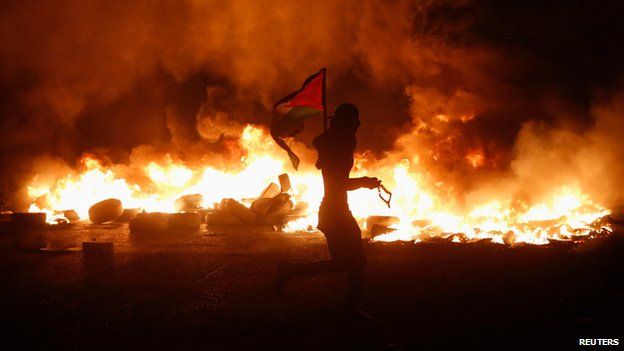Palestinians killed in West Bank Gaza solidarity march
- Published

At least two Palestinians have been killed and 200 wounded in the West Bank during protests against Israel's campaign in Gaza, officials say.
About 10,000 protesters marched from Ramallah towards East Jerusalem, where they were met by Israeli forces.
At least 15 people died and scores were injured when a UN-run shelter came under fire in Gaza on Thursday.
More than 800 Palestinians and 35 Israelis have died since the Israel-Hamas conflict began on 8 July.
Palestinian leaders in the West Bank have called for a "day of anger" on Friday, one of the last days of Ramadan.
The protest at Qalandia, outside Ramallah, saw Israeli border police use "riot control measures" and live fire. Protesters also used live ammunition, Israel said.
Large protests were also reported in Jerusalem on Thursday evening, after Israeli police prevented men under 50 from visiting the al-Aqsa mosque.
At least 20 protesters were arrested after they threw rocks at police, Israeli police said.
Israel launched its military offensive with the declared objective of stopping Hamas firing rockets into Israel.
It has since discovered a network of tunnels used by militants to infiltrate Israeli territory, and has vowed to destroy them to restore security.
Efforts to broker a ceasefire have been continuing despite the continued violence.
Reports suggest a deal under discussion could allow Israeli forces to remain in Gaza to destroy tunnels.
At the scene: Nawal Assad, BBC Arabic, Qalandia
Dozens of Palestinian protesters were injured when they reached the Qalandia checkpoint as Nawal Asaad reports
Palestinian leaders say this is the start of the "uprising of freedom and independence". Thousands marched from the outskirts of Ramallah towards the Qalandia checkpoint calling for an end to the Israeli occupation.
Youths threw stones and petrol bombs towards the checkpoint and tried to destroy the barrier. I heard the sound of rubber bullets and occasional live fire. Israeli police say they used sound bombs and tear gas.
The demonstration was called for by a group of youths on Facebook, among them the son of the popular imprisoned Fatah leader Marwan Barghouti. Palestinian President Mahmoud Abbas has urged Palestinians to expand the protests, and leaders in the West Bank have called for a "day of anger" on Friday.
Gaza school: Pools of blood
Palestinian families were in the school in Beit Hanoun, fleeing Israel's offensive against Hamas militants when they came under attack on Thursday.
The BBC's Ian Pannell reports from Gaza on the victims "too young to understand"
Israeli government spokesman Mark Regev: "It's not clear it's our fire"
It was the fourth time in as many days that a UN facility has been hit.
Correspondents say pools of blood lay on the ground in the courtyard of the school in Beit Hanoun, and there was a large scorch mark where it appeared a shell had hit.
Secretary General Ban Ki-moon condemned the strike, and UN officials said that during the course of the day they had been trying to negotiate a window of time with the Israeli army for civilians to leave the area because of the heavy fighting.
Chris Gunness, a spokesman for the UN Relief and Works Agency for Palestine refugees (Unrwa), said the Israeli army had been formally given the co-ordinates of the shelter in Beit Hanoun.
According to the UN, more than 118,000 people are now sheltering in UN schools and people are running out of food.
Lt Col Peter Lerner, a spokesman for the Israel Defense Forces (IDF), did not admit responsibility for the attack on the school.
"We do not target the UN. We do not target civilians. There was no target in the school. Gunmen were attacking soldiers near the facility. The school was not a target in any way."
Israeli PM Benjamin Netanyahu said on Thursday he regretted each Palestinian civilian death, but said they were "the responsibility of Hamas".
Hamas leader: Gaza 'a prison'
Hamas leader Khaled Meshaal: "There should be a genuine guarantee to lift the siege in Gaza"
Hamas leader Khaled Meshaal told the BBC he wants a ceasefire and end to Israel's blockade as soon as possible.
"We don't want to be controlled by a border crossing that makes Gaza the biggest prison in the world," Mr Meshaal, who lives in exile in Qatar, told BBC Hardtalk.
"People cannot go for medical treatment or to work. Why are the people of Gaza being punished by a slow death in the world biggest prison? This is a crime."
The UN's Office for the Coordination of Humanitarian Affairs (Ocha) says a 3km (1.9 mile) wide strip, encompassing 44% of Gaza, has been designated as a no-go zone by the Israeli military since the current conflict began.
Israel imposed restrictions on the Gaza Strip in 2006, after Hamas abducted Israeli soldier Gilad Shalit.
The measures were tightened by Israel and Egypt in 2007, after Hamas ousted rival Fatah and forcibly took control in Gaza after winning elections the year before.
Hamas and Fatah announced a reconciliation deal in April, but the move was condemned by Israel - which regards Hamas as a terrorist group.
- Published24 July 2014
- Published23 July 2014
- Published23 July 2014
- Published24 July 2014